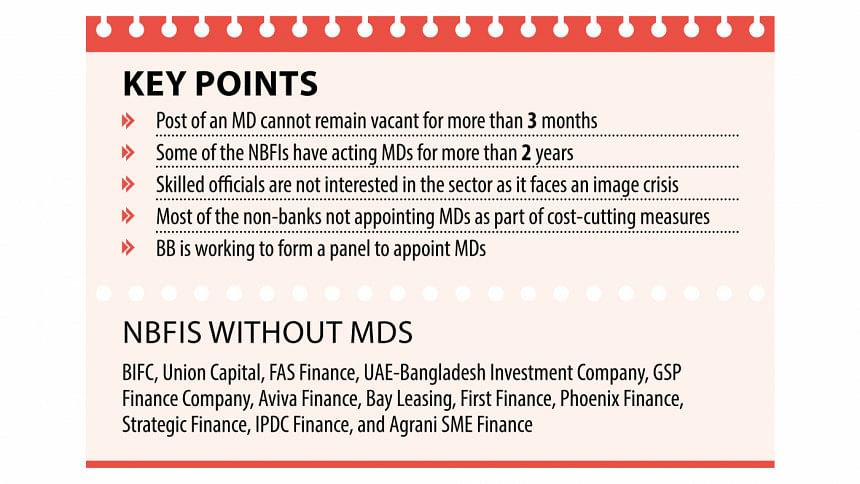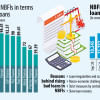A third of NBFIs running without MDs

Twelve non-bank financial institutions (NBFIs) in Bangladesh are running without a regular managing director or chief executive officer and a majority of them have had their top post vacant for more than three months in a clear breach of laws.
The absence of the top executives is a latest blow for a sector reeling from scams, irregularities and a liquidity crunch.
The 12 companies are Bangladesh Industrial Finance Company (BIFC), Union Capital, FAS Finance, UAE-Bangladesh Investment Company (UBICO), GSP Finance Company (Bangladesh), Aviva Finance, Bay Leasing, First Finance, Phoenix Finance, Strategic Finance, IPDC Finance, and Agrani SME Finance.
Currently, additional managing directors (AMDs), deputy managing directors (DMDs), and other senior officials are running the companies as acting MD or CEO, with some acting for more than two years.
However, the top job of a finance company can't remain vacant for more than three consecutive months, as per the Finance Companies Act 2023.
If the post is not filled within the period, the Bangladesh Bank will be able to appoint an administrator. However, the central bank has yet to install any administrator even if the deadline has passed for more than half a dozen NBFIs.
Contacted, BB Executive Director and Spokesperson Md Mezbaul Haque told The Daily Star that the companies were running without a managing director by taking permission from the central bank.
Status of 12 NBFIs
BIFC became a hotbed of financial irregularities between 2005 and 2014 and fund embezzlement took place during the period. As of September, bad loans stood at Tk 743 crore.
Md Anwarullah Sadeq, a senior vice-president of BIFC, has served as the acting MD since July last year.
He said the process of appointing the MD is underway. "The new shareholders have taken charge of the board and arranged just a single meeting."
Union Capital was known as a reputed financial institution till 2017. Since then, it has been struggling to repay depositors despite the funds reaching maturity.
It hit the headlines in 2021 after it failed to repay the deposit of Tk 100 crore to British American Tobacco Bangladesh. The company had a bad loan ratio of 43.12 percent in September, BB data showed.
ANM Golam Shabbir, DMD of Union Capital, has been working as the acting MD since January 2022.
He also said the process of appointing a new MD is going on.
"We are going through a bad time, so experienced officials don't want to come to join our company. As a result, we are not finding any suitable candidate."
The NBFI is going to merge with Prime Bank as soon as the central bank approves the proposal.
FAS Finance, one of the victims of the gross irregularities committed by Prashanta Kumar Halder, widely known as PK Halder, and people associated with him as they swindled thousands of crore money from at least four NBFIs, including FAS Finance.
The Bangladesh Securities and Exchange Commission (BSEC) restructured the board of the company in May 2021. Currently, the company has no sponsor director or shareholder director.
AF Sabbir Ahmed, a DMD, has been running the company as the acting managing director for the last six months.
FAS Finance's bad loans stood at Tk 1,645 crore, which made up 90 percent of the funds disbursed.
Md Zillur Rahim Chowdhury, a senior official, is the acting MD at GSP Finance. Its bad loan rocketed to 92.37 percent.
Aviva Finance, previously known as Reliance Finance Ltd, where PK Halder was the managing director, is currently being led by M Mostafiduzzaman, an acting MD.
Aviva's defaulted loans amounted to Tk 1,902 crore, or 71.2 percent.
Mohammad Ruknuzzaman has been working as the acting MD of Bay Leasing, where half of the disbursed loans have defaulted, since September.
He is expected to become the next MD of the NBFI after BB's consent, said an official of the company.
Maksumul Mahmud, a former branch manager of First Finance, is now working as the acting MD of the NBFI, whose 89 percent of loans have turned sour.
In December, the BB suspended Intekhab Alam, MD of Phoenix Finance, for loan irregularities. Since then, Mohammad Sayduzzaman, an executive vice-president, has been working as the acting MD.
The NBFI's bad loans ratio stood at 58 percent.
Strategic Finance, a new NBFI, is being led by acting MD Tamim Marzan Huda. He was a DMD previously.
MM Mostafa Bilal, DMD of UBICO, a joint venture financial institution of the governments of the UAE and Bangladesh, has been leading the firm as the acting chief since mid-2021.
"Before appointing someone as a full-fledged MD, the company closely monitors the performance of the designated official. As part of the norms, I have been put in the current charge," he said.
The post of the MD at IPDC Finance, one of the top NBFIs in Bangladesh, fell vacant in January after long-time CEO Mominul Islam resigned. The company is yet to announce his replacement.
Shah Md Ahsan Habib, an independent director of IPDC Finance, said appointing the new MD is now at the final stage.
"We are now awaiting BB's approval."
Agrani SME Finance, a subsidiary of state-run Agrani Bank, is being run by acting managing director Md Muzahidul Islam Zoarder.
Reasons for a dearth of MDs
There are 35 NBFIs in the country.
Industry people say that most of the NBFIs are involved in loan irregularities, which have sent their default loans to a higher level and brought about a liquidity crisis. This keeps experienced people at bay.
Even, half a dozen of the companies in the sector have failed to repay the depositors' money, spooking the confidence in the industry.
The sector's combined bad loans stood at Tk 21,658 crore at the end of September, accounting for a record 30 percent of the disbursed loans, central bank data showed.
The bad loan ratio is more than 80 percent in seven companies.
Toufic Ahmad Choudhury, a former director-general of the Bangladesh Institute of Bank Management, said some NBFIs are witnessing a shortage of eligible MDs because there are too many financial institutions given the size of the economy.
Currently, there are more than 100 financial institutions, including banks, in Bangladesh whereas in the 1980s, the number was eight to 10, he said.
"We don't need so many financial institutions."
According to Choudhury, there is a dearth of skilled executives at financial institutions. As a result, some NBFIs have appointed people with a lower level of skills, leading to a fragile condition of the sector.
The analyst pointed out that some NBFIs can't pay salaries to their staff because of their weak financial health.
"As a result, they are being forced to run the companies through mid-level officials as part of their efforts to reduce operational costs."
"Besides, skilled and experienced financial sector professionals don't want to work for a sector that is facing an image crisis."
A former MD of an NBFI says as many NBFIs are in bad shape, the job of a CEO has become difficult.
"These companies are struggling to regain their good health and the salary packages are not attractive enough for the experienced professionals to assume the risk."
The official said there are several restrictions in the new Finance Companies Act that have limited business opportunities for the sector.
BB's initiative to find MDs for NBFIs
The BB is now working to form a panel to find experienced bankers to appoint them as the MDs in the NBFIs.
The regulator has already sent letters to six banks citing the names of the officials who qualify to lead the ailing NBFIs.
The six banks are Sonali Bank, Rupali Bank, Agrani Bank, Janata Bank, Uttara Bank and Pubali Bank.
"We have already received some CVs from experienced bankers who wanted to lead the NBFIs," said Mezbaul Haque of the BB.
Mohammed Nurul Amin, an independent director and the chairman of FAS Finance, said they have sought an extension of the deadline from the BB to appoint an MD to June this year.
"We have no intention to raise the operational expenses, so a DMD is serving as the acting MD."
"Now we are not getting deposits and the loan recovery is not satisfactory."

 For all latest news, follow The Daily Star's Google News channel.
For all latest news, follow The Daily Star's Google News channel. 






Comments